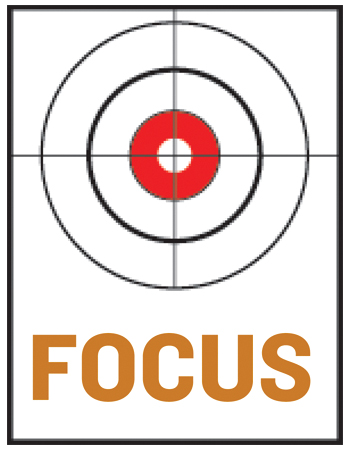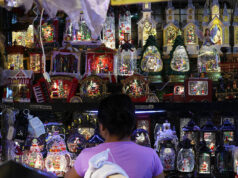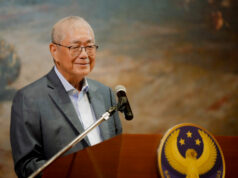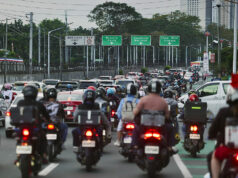Kingmaker Duterte’s political capital rests on Russian vaccine success
By Gillian M. Cortez, Reporter
REGINA S. VALDUEZA (not her real name), 24, has been staying at a government quarantine facility near the Philippine capital after she was diagnosed with the coronavirus on Aug. 12.
“I do trust I’ll be OK soon,” she said in a Viber message. “When you’re under quarantine, you just want to be OK as soon as possible.”
Ms. Valdueza is completely dependent on government health workers who have assured her that she will recover soon. “I hope trusting the government on this won’t bite me in the back one day.”
 Analysts have criticized President Rodrigo R. Duterte’s reliance on a vaccine from both Russia and China to contain a coronavirus pandemic that has sickened nearly 170,000 and killed more than 2,600 people in the Philippines.
Analysts have criticized President Rodrigo R. Duterte’s reliance on a vaccine from both Russia and China to contain a coronavirus pandemic that has sickened nearly 170,000 and killed more than 2,600 people in the Philippines.
“The only salvation available to humankind at this time of life, if you are stricken with the virus, is always a vaccine,” the President said in a televised public address late Monday.
Analysts said Mr. Duterte’s political capital rests on the success of planned trials involving a Russian coronavirus vaccine.
“If this Russian vaccine succeeds, then good for our country,” Marlon M. Villarin, a political science professor from the University of Santo Tomas, said in a Viber message. “If not, it could be the endgame for Duterte politics.”
Mr. Duterte, who volunteered to get a shot of Russia’s Sputnik V vaccine, is under pressure to stop a fresh surge in COVID-19 infections, leading him to put Metro Manila and nearby provinces back under a strict lockdown until Aug. 18.
The President, down to his last two years in office and barred by law from seeking reelection, is also hard-pressed to keep his political capital and ensure the victory of his chosen candidate in the 2022 presidential elections. At least three presidents before him had either been sued or jailed for corruption.
Russian President Vladimir Putin on Aug. 11 said his country had developed the first vaccine for the coronavirus. Critics have questioned the safety of the vaccine from the Gamaleya Research Institute of Epidemiology and Microbiology since vaccines take years to develop.
‘FATHERLY GESTURE’
The Philippines and Russia seek to run phase 3 clinical trials of the vaccine from October to March, and these may involve as many as 3,000 volunteer patients, presidential spokesman Harry L. Roque said last week.
Mr. Duterte, who’s been isolated after being exposed to a Cabinet official who had tested positive for the virus, should take steps to stop the spread of the coronavirus instead of relying too much on a vaccine that may take long to mass produce, said Maria Ela L. Atienza, a political science professor from the University of the Philippines.
Using mostly poor patients in the Russian vaccine trials also raises ethical issues, she said in an e-mailed reply to questions.
“The intention of the President in accepting this offer from Russia is more of a political/diplomatic strategy,” Ms. Atienza said, noting that Mr. Duterte has tried to expand relations with Russia and China since he took office in 2016.
“Given the rising cases of infection, he needs to also show that he is doing something and Russia was the first country to announce a vaccine,” she added.
Mr. Duterte appears to have hastily announced Russia’s vaccine offer without consulting local Health authorities, which is problematic given people’s diminished trust in vaccines amid a still unresolved issue involving Dengvaxia, Ms. Atienza said.
“There are still questions from scientists and medical experts worldwide about the vaccine’s hasty approval without adequate proof of its efficacy,” she added.
“For the educated and technical citizen, to consider the Gamaleya vaccine is like sending your people straight to the slaughter house,” Mr. Villarin said.
But most Filipinos might see it as a “fatherly gesture” after Mr. Duterte said he would sell government assets so he could buy more vaccines once these become available.
‘RIGHT POLICY’
“The diplomacy of the President is the right policy,” his chief lawyer Salvador S. Panelo said by telephone.
He added that the palace had been aware of the controversies surrounding the Russian vaccine, and the local Food and Drug Administration (FDA) would still have the final say on its safety.
“We are aware of this news but whatever happens, it has to undergo FDA examination,” Mr. Panelo said. “We have our own protocols.”
The 75-year-old Mr. Duterte last week thanked Russia for supposedly offering to send the vaccines to the Philippines for free. He claimed the Russian vaccines could arrive by September or October.
The palace later said the Philippines would have to wait until next year for the vaccine to become commercially available.
The Department of Health (DoH) has allotted P2.4 billion for COVID-19 vaccines in its budget for 2021 and this could change depending on the price.
China is the other country Mr. Duterte mentioned in the past that had pledged to prioritize the Philippines for coronavirus vaccine supplies once they develop one.
Mr. Duterte has been criticized for failing to detail a national strategy to combat the pandemic and help the economy get out of a recession in his yearly address to Congress in July.
The country entered into a recession last quarter after economic output shrank by 16.5%.
Ms. Valdueza, mentioned at the outset, said she’s not too hopeful about the Russian coronavirus vaccine.
“I’m not very optimistic about the vaccine, to be honest,” she said. “I hope it succeeds, but I’m very wary about recent developments. I’ll probably pass on getting a shot, unless we’re required or if half of the world is doing it.”



